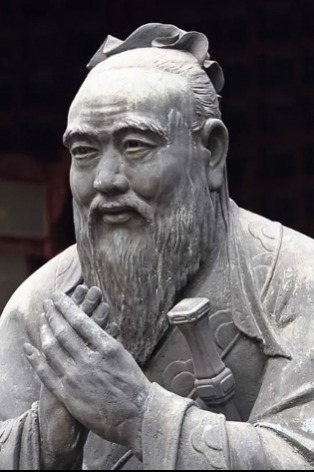Kong Qiu
Biography
Kong Qiu, known to the world as Confucius, was a Chinese philosopher, teacher, and political thinker whose ideas shaped the moral and social fabric of East Asia for over two millennia. His teachings emphasized ethics, respect, education, and harmony in both personal and political life, forming the foundation of Confucianism.
Early Life and Education
Kong Qiu was born on September 28, 551 BCE, in Qufu, in the state of Lu (modern-day Shandong Province, China). He came from a noble but impoverished family. Despite his modest upbringing, he showed a deep interest in learning and self-cultivation from an early age.
Confucius studied ancient Chinese literature, history, music, and rituals, developing a lifelong passion for knowledge. His respect for tradition and moral order led him to believe that virtue and education were essential for both personal growth and good governance.
Career and Teachings
Confucius began his career as a teacher, attracting many students who admired his wisdom and integrity. He taught the importance of benevolence (ren), righteousness (yi), propriety (li), wisdom (zhi), and trustworthiness (xin) — values that he believed would lead to harmony in society.
Later, he served in minor government positions in the state of Lu and eventually became an advisor and magistrate. His goal was to restore social order by promoting moral leadership and ethical governance rather than strict laws and punishments.
However, his political reforms faced resistance, leading Confucius to leave Lu and travel through various states for over a decade, offering his teachings to rulers. Though he was never able to fully implement his political vision, he continued to spread his moral philosophy to his disciples.
After returning to Lu, Confucius devoted the rest of his life to teaching and editing classical texts such as the Book of Poetry, Book of Documents, and Book of Rites, which became central to Chinese culture and education.
Death and Legacy
Confucius died in 479 BCE at the age of 72. His followers compiled his sayings and ideas into the “Analects,” which became one of the most important works in Chinese philosophy.
Confucianism later became the guiding ideology of Chinese society and government, influencing Korea, Japan, and other parts of East Asia. His teachings on respect for elders, loyalty, family values, and moral integrity continue to resonate across cultures today.
Conclusion
Kong Qiu’s life was dedicated to the pursuit of virtue, wisdom, and social harmony. Through his belief that moral education and compassion could bring peace to the world, he became one of humanity’s most enduring teachers. His timeless philosophy continues to inspire people to live with integrity, respect, and a sense of duty toward others.
